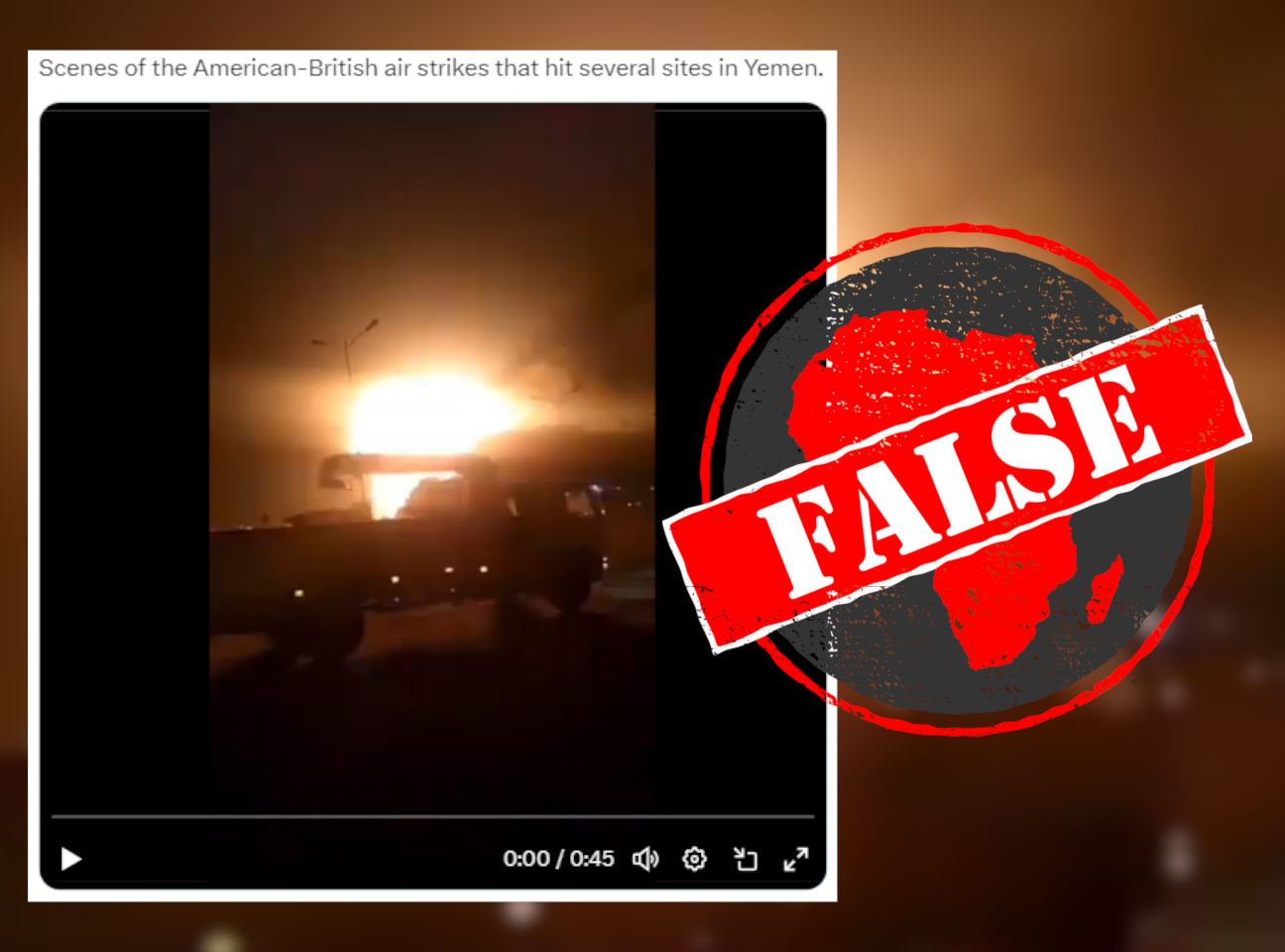IN SHORT: A video clip of an explosion has been posted widely on social media, with the claim it shows US-UK airstrikes on Houthi targets in Yemen in January 2024. But the video is some months older than that and is being shared out of context.
On the night of 11 January 2024 a coalition of countries that included the US and UK hit more than a dozen sites in Yemen with missiles launched from jets, warships and submarines.
The strikes were in response to almost two months of attacks from Houthi-controlled regions of Yemen on vessels in the Red Sea. The sea connects to the Mediterranean in the north via the Suez canal and is part of an important global shipping route.
Soon after news of the bombardment broke, a video clip appeared on social media in South Africa and elsewhere with the claim it showed a scene from the attack.
The 15-second clip sometimes appears as the first of two segments of a video that shows a second explosion (not verified here). In other instances it’s been posted alone.
The clip is dark and shaky, but what can be seen is a sudden fireball that mushrooms into the night sky as vehicles drive in the foreground.
One common caption reads: “Scenes of the American-British air strikes that hit several sites in Yemen. 12/1/24.”
Another reads: “US and UK are bombing Yemen’s capital right now because the Houthis were blocking ships going to Israel in support of a ceasefire for Gaza.”
Yemen is a country on the western tip of the Arabian peninsula in the Middle East, bounded by the Red Sea and the Gulf of Aden.
Since 2014 the country has been wracked by a brutal civil war between its Saudi Arabia-backed government and Houthi rebels supported by Iran.
Houthi leaders have said their attacks on Red Sea shipping – which began on 19 November 2023 and have included drone and missile strikes, and hijacking – are aimed at ending Israel’s war on Gaza. The stated targets are ships owned, registered or operated from Israel, but vessels from many different countries have been hit.
The clip can also be seen here, here, here, here, here and here.
But while it was shot in Yemen, it first appeared online before the start of the Israeli war on Gaza in October 2023, before the Houthi attacks began in November, and before the US-UK strikes in January 2024.

Explosion at Mufazer gas station in September 2023
Africa Check ran screenshots from the video through a Google Lens reverse image search.
This led us to the same video posted on X (formerly Twitter) on 3 September 2023.
A machine translation of its Arabic caption reads, in part: “Watch the moment the Al-Mafzar station exploded in Sanaa Urgent - A source in the Civil Defense: Efforts to extinguish the fire at the gas station continue …”
Sana’a is the capital of Yemen.
We then googled “Sana’a Al-Mafzar gas station explosion Yemen”, restricting the results to early September 2023, and uncovered several news reports on the incident.
According to the Yemen Press Agency, the blast took place on 3 September at Mufazer gas station in the northeastern part of the capital.
We also found the video on the Newsflare stock video site, with the same date. Its caption begins: “A massive explosion rocked a gas station in the Houthi-controlled Yemen's capital of Sanaa on Sunday night, igniting a significant fire, reported by authorities and witnesses.”
It was also uploaded on the New China TV YouTube channel on 4 September with a similar description.
The video shows an explosion at a petrol station in Yemen’s capital of Sana’a in September 2023, not air strikes on the country in January 2024.
Republish our content for free
For publishers: what to do if your post is rated false
A fact-checker has rated your Facebook or Instagram post as “false”, “altered”, “partly false” or “missing context”. This could have serious consequences. What do you do?
Click on our guide for the steps you should follow.
Publishers guideAfrica Check teams up with Facebook
Africa Check is a partner in Meta's third-party fact-checking programme to help stop the spread of false information on social media.
The content we rate as “false” will be downgraded on Facebook and Instagram. This means fewer people will see it.
You can also help identify false information on Facebook. This guide explains how.


Add new comment